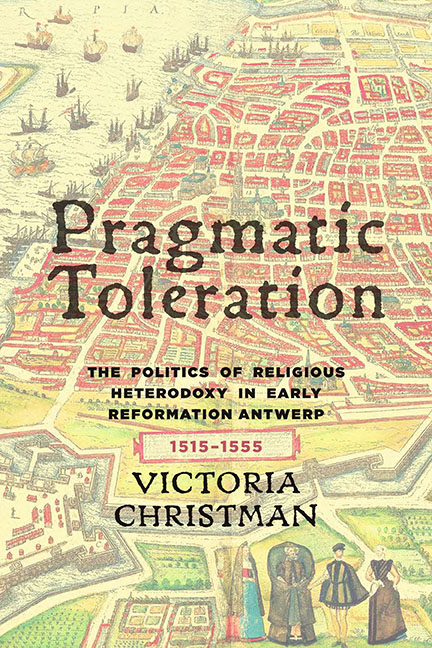Book contents
- Frontmatter
- Dedication
- Epigraph
- Contents
- Acknowledgments
- Introduction
- 1 The Lay of the Land: Government and Law in Brabant
- 2 Undercover: The Claes vander Elst Conventicle
- 3 Pragmatic Intolerance: Antwerp's Anabaptists
- 4 People of the Book: Heterodox Printers and Publishers in Antwerp
- 5 Between Stage and Scaffold: Rederijker Trials in Antwerp
- 6 Trade in Tolerance: The Portuguese New Christians in Antwerp, 1526–50
- Conclusion: Rulers and Religious Renegades
- Appendix 1 Chronology of Antiheresy Legislation in Brabant
- Appendix 2 Answers at Ghent
- Abbreviations
- Notes
- Bibliography
- Index
2 - Undercover: The Claes vander Elst Conventicle
Published online by Cambridge University Press: 15 March 2018
- Frontmatter
- Dedication
- Epigraph
- Contents
- Acknowledgments
- Introduction
- 1 The Lay of the Land: Government and Law in Brabant
- 2 Undercover: The Claes vander Elst Conventicle
- 3 Pragmatic Intolerance: Antwerp's Anabaptists
- 4 People of the Book: Heterodox Printers and Publishers in Antwerp
- 5 Between Stage and Scaffold: Rederijker Trials in Antwerp
- 6 Trade in Tolerance: The Portuguese New Christians in Antwerp, 1526–50
- Conclusion: Rulers and Religious Renegades
- Appendix 1 Chronology of Antiheresy Legislation in Brabant
- Appendix 2 Answers at Ghent
- Abbreviations
- Notes
- Bibliography
- Index
Summary
Conventicle leader Claes vander Elst and a group of more than sixty of his followers were discovered and prosecuted in 1527. Their case is something of an exceptional example among the case studies in this volume, in that it was not centered in Antwerp, and did not involve the Antwerp court. However, many of the members of the conventicle (including vander Elst himself) either resided in the city, had done so previously, or had become involved in the group as a result of their experiences there. Although the Antwerp council was not one of the prosecuting authorities in this particular case (indeed, no municipal council seems to have been involved, as we shall see), as one of the best-documented religious prosecutions of the early sixteenth century, it provides a clear example of the jurisdictional confusion that existed in these early years, and the accidental toleration that resulted from it, as well as the internal toleration among the members of the group.
The Claes vander Elst case is important in the history of heterodoxy in the Low Countries in that it displays three key features of prosecutions in this period. First, it clearly demonstrates the extraordinary degree of jurisdictional ambiguity prevailing at this early stage of Charles's religious policy, when it was not yet even clear who the prosecuting authorities were supposed to be. Likewise, the specific terms of the edicts being applied had not yet been fully defined, leading to a significant degree of confusion in the sentencing phase of the trial. Second, this case illustrates both the cohesion and complexity of this group of dissenters. That is, their beliefs, detailed in scores of extant depositions, were quite theologically diverse. Even so, they formed a coherent group, providing a good example of what Brad Gregory refers to as a “solidarity of international survival” that served to unify otherwise disparate groups of religiously disaffected burghers in this preconfessional period. Finally, the members of this group acted with a blatant disregard for the consequences of their heterodox actions. Their behavior suggests that they did not perceive the emperor's edicts as a real threat at this point.
- Type
- Chapter
- Information
- Pragmatic TolerationThe Politics of Religious Heterodoxy in Early Reformation Antwerp, 1515–1555, pp. 36 - 55Publisher: Boydell & BrewerPrint publication year: 2015

